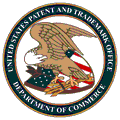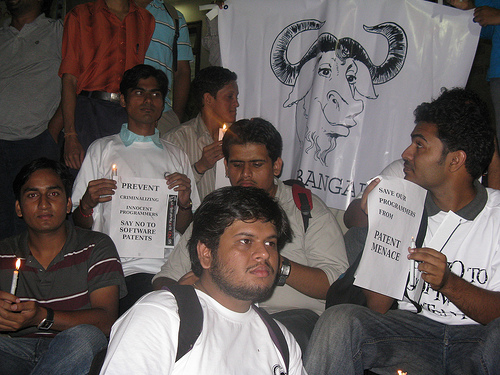01.04.13
Posted in America, Asia, Patents at 4:36 pm by Dr. Roy Schestowitz

Summary: Amid loss of edge in the innovative industries, a turn to patents is seen for PR and protectionism
The patent war is bound to get interesting now that the US loses its lead. The Economist says: “China’s patent office received more applications than any other country’s in 2011, according to the World Intellectual Property Organisation, a UN body which follows 125 patent offices.”
Suffice to say, those numbers don’t means much, but they are used for vanity purposes. The US will try to pass off more ideas as patentable. The USPTO is trying to manufacture consent for software patents right now:
There is a notice in the Federal Register that the USPTO would like to form a partership with the software community to figure out how to “enhance” the quality of software patents.
The more patents the USPTO approves, the more “innovation” it will claim. Here is the government’s bad stance and a new case study against software patents:
Why Software Patents Should Be Banned: A Case Study
Joe Mullin provides us with the latest in the patent troll wars. Last year, a guy named Steven Vicinanza, the founder of BlueWave Computing, got a letter from Project Paperless LLC telling him that he needed to pay $1,000 per employee because he uses networked scanners in his business:
That was Mother Jones.
Over at Bloomberg (plutocrats), the lawyers, or the 1% who are parasitical, have their say. To quote: “Clearly I didn’t ask enough patent attorneys for impressions of what’s going on in their corner of the cyberlaw world. There is a lot going on there. Complaints about how the patent system is impeding innovation, complaints about the complainers about the patent system, a new unified patent system in the European Union and a new court to keep things unified (that’s a lot of uniformity!), a new way of evaluating patents on business methods ushered in by the America Invents Act, and another big case in Federal Circuit involving a the patentability of computer software.”
Don’t ask patent lawyers. Ask real stake holders, people who actually produce something. █
Permalink
 Send this to a friend
Send this to a friend
12.31.12
Posted in America, Patents at 4:41 am by Dr. Roy Schestowitz

 Summary: Some new stories which show what a sordid mess the US patent system became over the decades
Summary: Some new stories which show what a sordid mess the US patent system became over the decades
In the US, “even lawyers think patent system is broken,” writes Glyn Moody regarding this article from Groklaw. We wrote a lot about the USPTO (headed by a former manager at a software patents booster*) and so did Timothy B. Lee, who identifies more pertinent parts of the problem. To quote:
People have radically different views of the patent system. Critics see it as an unmitigated disaster, while many in the patent bar don’t understand what all the fuss is about. But it’s rare for prominent advocates of these contrasting perspectives to engage each other directly.
But that happened on Wednesday in a teleconference debate hosted by the Federalist Society. Defending the status quo was Judge Paul Michel. Until 2010, Michel was the chief judge of the Federal Circuit Court of Appeals, a post that made him the nation’s top patent judge. He debated Judge Richard Posner, a Chicago-area appeals court judge who threw out a patent lawsuit between Apple and Motorola earlier this year, complaining that the patent system had descended into “chaos.”
The other day we wrote about the EFF’s latest endeavour against the US patent system (it worries about innovation) — an important effort that got backing from rich people, as covered in FOSS blogs too:
If you happen to be familiar with billionaire Mark Cuban’s famous blog, then you’ve probably listened to his pontifications about the broken U.S. patent system many times. Now, Cuban, along with game developer Markus “Notch” Persson, is putting his money where his mouth is. The Electronic Frontier Foundation (EFF) has announced a half-million dollar donation from Cuban and Persson to boost the foundation’s efforts to reform the patent system. The donation also creates a newly named position at the foundation: “The Mark Cuban Chair to Eliminate Stupid Patents.”
Here is more on that [1, 2, 3, 4, 5, 6, 7, 8]. Reports were numerous.
Over at Wired, the stacked panel continues this Xmas, this time with an Assistant Professor of Law. The lawyers and career law professors don't offer solutions which make lawyers obsolete. It’s lawsuits like this new one which give them business at the expense of those who have real products. To quote: “Netflix has been hit by a patent infringement lawsuit by Open TV, now a subsidiary of Nagra, the Switzerland-based conditional access company, part of the Kudelski Group. It has not said what the patents are, but the filings at the US District Court for the District of Delaware show that they are all software patents.”
How about this new $1.17 billion patent lawsuit? Guess who the cost is transferred to? This is yet another instrument for passing wealth from the vast majority to the oppressive rich minority.
What “law” people suggest is not enough. It’s not enough to stop patent trolls, either. We need to end all software patents, everywhere. We need to name those who stand in our way. █
___
* IBM typically tries to hide it by keeping rather silent. Bloggers seem surprised by IBM’s position and Pogson writes: “They proceed from begging the question to blatant error in logic. I hope this is just the vomit of one of their lawyers and not the philosophy of the corporation… otherwise, IBM is doomed to sue and be sued forever.” This is not the correct assessment. IBM uses software patents to empower the cartel it leads, allowing it to sell artificially overpriced products. When it comes to patent policy, IBM is our enemy.
Permalink
 Send this to a friend
Send this to a friend
12.16.12
Posted in America, Apple, Law, Patents at 6:16 am by Dr. Roy Schestowitz
 Summary: Action against patent trolling seems imminent, but the behaviour of companies like Apple is largely overlooked for now
Summary: Action against patent trolling seems imminent, but the behaviour of companies like Apple is largely overlooked for now
Parasitical elements in a government-backed scheme are being tackled by the government, which is still investigating the matter. Apple has been suing Android, which it views as a top rival. The aim is to tax (make more expensive) or castrate Android. As one report put it last week:
At the end of August, Apple Inc seemed on top of the world. Fresh off a resounding $1.05 billion U.S. legal victory over arch-foe Samsung Electronics Co Ltd, the company was gearing up to launch the fifth iteration of its iconic iPhone. Just a week prior, its market value had surpassed Microsoft Corp’s and it became the most valuable technology company in history.
Things have gotten worse for Apple since then. Samsung phones easily outsells Apple ones and Apple’s public identity, that of somewhat of a troll, did its reputation a lot of damage. Trial misconduct [1, 2] does not help, either. As Groklaw put it:
Yet in a later media event at Gizmodo where anyone could ask him questions, Hogan was asked a question about whether he had considered if the patents should have issues, which he answered by contradicting the above instructions:
Demon-Xanth: Did you have the opportunity to ask “Is this something that should be patentable?” during the trial?
Velvin Hogan: @Demon-Xanth No, however it was not the function of this jury to ask that. We were bound to use the law as it is today. The patents were issued the judge instructed us not to second guess the current patent system.
Samsung said he was “deliberately dishonest”.
The Federal Trade Commission, which we wrote about in [1, 2], misses the point; it should know by now that the problem is not trolls, it’s the system. But addressing the problem by debating it would be a good start:
The Federal Trade Commission and Department of Justice will hold a joint public workshop on Dec. 10, 2012, to explore the impact of patent assertion entity (PAE) activities on innovation and competition and the implications for antitrust enforcement and policy.
“Professor Chien relates (at around 33:55) that in 2012, 61% of all new patent litigation was brought by trolls, that is by entities that don’t make anything,” remarks Pamela Jones. Here is a new article about the cost of patent trolls:
Patent trolls drain businesses of billions of dollars a year. And if you have a website–any website–you are a potential target. Here’s what you need to know if they come after your business.
Here is another article:
For the first time, individuals and companies that do not themselves make anything – commonly known as “patent trolls” – are bringing the majority of U.S. patent lawsuits, according to a study by a California law professor.
The Federal Circuit is said to have another chance to change course and do the right thing:
Federal Circuit Declines Chance to Eliminate Split Involving Standard of Review, Prompting Blistering Dissent
[...]
“Not surprisingly,” Judge Moore explained, “given the clear direction from the Supreme Court, the regional circuits are unanimous that the issue of objective reasonableness under Rule 11 is to be reviewed deferentially by the appellate courts.”
The software patents booster calls it a troll turning point:
On Friday, December 7, 2012, the United States Court of Appeals for the Federal Circuit issued a precedential opinion in Raylon v. Complus Data that gives hope to defendants everywhere who face objectively baseless patent infringement claims.
It seems like the FTC and some high courts still have an opportunity to change course. Let’s wait and see. The problem is, there are patent lawyers everywhere, at all levels. They try to guard the status quo and make things worse by assimilation, e.g. in Europe and New Zealand. █
Permalink
 Send this to a friend
Send this to a friend
12.15.12
Posted in America, Asia, Patents at 12:07 pm by Dr. Roy Schestowitz

Summary: India enjoys abundance, whereas the US lets corporations create scarcity that kills people and also suppresses startups
A new post from a startup person, not a lawyer pretending to represent startups, explains why software patents are a “nightmare”. This is becoming a trend; in fact, whenever it’s a non-lawyer writing on the subject the outcome is the same.
In a video we posted very recently about Apple patents that can make one cringe it is easy to see where USPTO failed. Masnick shares such videos:
We’re hearing more and more talk about how broken the patent system is, and recently came across a pair of videos we figured some of you might enjoy. The first is a comedic riff on Apple’s recent page turn design patent, leading Ron Charles to post an amusing video of how Apple might explain its patenting of “letters”
These had an impact on other influential sites in the US. They are turning against their patent system.
Masnick’s American site watches with envy what India is doing:
Getting rid of the first modern drug patent in this way neatly symbolizes the country’s aggressive new attitude to Western-held monopolies on medicines. It’s interesting that in this case the opposition came not from the Indian government, but from Sankalp Rehabilitation Trust, a non-governmental organization, which hopes to source the drug from a manufacturer of generics cheaply enough to be able to give it away for free. This may well inspire post-grant opposition from other organizations seeking to provide cheaper drugs to the sick in India through the use of generic versions.
My mother revealed to me last week that those generics give India a huge advantage and distribution worldwide is only impeded by draconian patent laws (barring import), which are artificial barriers or protectionism.
Patent-hostile site IP Watch also covered it:
India last week saw a landmark public health decision on the evolving role of intellectual property rights in the context of the public interest.
The country’s Intellectual Property Appellate Board (IPAB) revoked a patent granted in India to F. Hoffmann-La Roche AG (Roche) for pegylated interferon alfa-2a (Pegasys), a medicine used to treat Hepatitis C.
Attempts to push software patents into India were made some years ago, but the population there seems to be sufficiently informed and eager to fight back against multinationals. No wonder India is booming. Even software development goes there. When did we last hear about patent trolls or even patent lawsuits involving software in India? In Europe, the situation has not been too bad, either, but Richard Stallman warned about 7 years ago that letting software be patented in Europe would give advantage to patent aggressors outside of Europe. So-called ‘free trade agreements’ (or similar treaties) try to globalise patent regime (i.e. extend scope of monopoly). Passage of those relies on keeping the population in the dark because that’s a disgrace which is only good for multinational corporations. █
Permalink
 Send this to a friend
Send this to a friend
12.05.12
Posted in America, Apple, Asia at 2:33 pm by Dr. Roy Schestowitz

Summary: Apple’s imperialistic behaviour to enjoy no backroom treatment anymore
A while back we wrote about Apple’s inability to keep extortion secret (the HTC case). Based on this analysis, only the extortion fee (if any) will stay secret:
The judge in the Apple v. Samsung case, the Hon. Lucy Koh, has just ruled that the HTC-Apple license agreement that was signed on November 11 will be made public, the only exception being the pricing and royalty terms, which will be sealed. Samsung’s lawyers have already gotten to see them, but we won’t. But we will get to see the list of patents covered by the agreement. If the patents on the list are the same patents as in this case, it will make it much easier for Samsung to avoid an injunction. As you just saw in the Microsoft v. Motorola case in Seattle, if money can make you whole, you normally can’t get an injunction. And if they aren’t, there is a Samsung argument that customers don’t care about those features enough to pay for them, which could impact the damages figure. This will be part of what is discussed at the hearing on the 6th.
A lot of this is the result of software patents, which Apple hopes to take global (India’s policies on patents, suggests this new article, still appears to be influenced by the software patents lobby). Why do companies from Taiwan and Korea need to bow to US courts and play by the rules of some bureaucracy known as USPTO, run by an American cartel of multinationals? Is Asia now a US colony? These phones are all made in Asia, even though Apple is trying to USA-wash the hypePad with labels like designed and assembled (boxed?) in USA, based on a report from last week. █
Permalink
 Send this to a friend
Send this to a friend
12.02.12
Posted in America, Patents at 6:40 am by Dr. Roy Schestowitz

Summary: The absurdity of software patents, the patent wars, and the coming era of patenting or privatising life’s code
ACTIVIST against software patents — a real one, not a “moderate” one — is having a go again. PolR from Groklaw has released the second part or his “Software Is Mathematics” argument, citing Stallman from the recent conference which was stacked by so-called ‘moderates’ (controlled opposition which does not seek to abolish software patents). To quote the opening part:
I argued in part 1 of this series that computations are manipulations of symbols with meanings. In this article, I hope to further explain this notion using the social science of semiotics. Its object is the study of signs, the entities which are used to represent meaning.
This article elaborates on what Richard Stallman said in the recent Santa Clara Law conference Solutions to the Software Patent Problem.
According to this report Richard Stallman described patents on software as patents on thought, which amount to patents on the use of the human brain to reason and to solve problems by the application of reasoning. This article uses semiotics to show that Stallman’s point is more than rhetoric. It is a provably correct statement of fact.
One portal covers the “biggest fighters of the patent wars”, but it misses Microsoft’s war behind closed doors and focuses on Apple (visible patent wars) instead. To quote:
The fight between proprietary software and free software is not new. Wherever there is technology and more importantly wherever there is competition; issue like patent infringements are bound to come up. Generally, infringement wars happen when more than one organizations bring out similar kind of products.
The idea of software patent is significant as far as it promotes the originality as well as innovation. But, to some extent, software patents are road blockers for novelty. Somewhere they can harm the creativity and an aspiration to create something naive.
It is found; numerous biggies in the industry are waging wars against each other over patents. Let’s explore some significant legal battles fought (or being fought), which are grabbing lime light in the smartphone industry these days…
The problem there is, Apple is all over the place and patent blackmail gets little or no coverage. One is the equivalent of going to war and another is occupation after threat of going to war against weaker countries/groups. We will deal with Microsoft’s tactics in a separate post because it merits a longer discussion.
It is worth noting that monopolies on genetics and parts of the human body are soon to be legitimised by SCOTUS [1, 2, 3] after the USPTO already granted them. The corporate press says:
The Supreme Court announced Friday it will decide whether companies can patent human genes, a decision that could reshape medical research in the United States and the fight against diseases like breast and ovarian cancer.
There is a lot of nonsense in this article because it focuses on benefits to corporations. To people, there are no benefits, only harm. It also harms competition, which is inherently anti-capitalist in the sense that it doesn’t let classical ‘free market’ capitalism do its thing. Here is the SCOTUS Blog page and a good rebuttal to it all:
But, of course, it was just the first step in a long process. Myriad took the case to the appeals court for the federal circuit (CAFC), the notoriously patent friendly appeals court. The only surprise here was that the US Justice Department actually said it agreed that genes shouldn’t be patentable (showing a potential disagreement within the administration, as the US Patent Office was not happy). End result? CAFC decided genes are patentable because they’re “separate” from your DNA.
We wrote about it before. CAFC is also partly responsible for software patents in the US. The system has gone rogue because the most important stakeholders, the public, get ignored. █
Permalink
 Send this to a friend
Send this to a friend
11.10.12
Posted in America, Patents at 9:03 pm by Dr. Roy Schestowitz

Summary: New examples from the news of software patents on malicious ideas
The USPTO has been granting too many patents after it lowered many bars. As of late, Techrights was relatively hostile towards the USPTO because the USPTO had become hostile to people and friendly to large corporations and to patent lawyers/trolls. There is no way indie developers can keep track of patents that are granted on software, for example. Engineers at Apple and Microsoft also confess that they don’t keep track of patents. So who is this system really for anyway? Is it just part of a pyramid scheme or cartel?
Now, watch how far software patents go:
Two rival financial software firms – both based in Richmond – are no longer battling in court.
Downtown-based Wealthcare Capital Management said Thursday that it had settled its lawsuit with Powhatan competitor PIEtech and banking giant UBS Financial in a patent infringement case that questioned the definition of the act of financial planning.
It is bad enough that algorithms game the stock markets; now the organised looting industry gets monopolies on those tricks too (a subject like this is beyond the scope of this Web site).
The boosters of software patents, including an account in Twitter called “swpats”, are usually not scientists at all. They also have no evidence to back their claims with. And watch how surveillance too becomes patent monopoly:
Microsoft Patents TV That Watches Back, Counts Heads, Charges Admission
Here’s a scenario for you: at some point in the the near future, you sit down in front of your Xbox 720/960/1080 and queue up a little video-on-demand from the Live Arcade selection of movies. You select a film from the menu and, before you can press the “Play” button, you are greeted with another menu giving you several price points, depending on how many people will be watching.
And some tell us that patents improve society…
Some scholars suggest going as far as nullifying all patents. █
Permalink
 Send this to a friend
Send this to a friend
11.05.12
Posted in America, Patents at 12:11 pm by Dr. Roy Schestowitz

Summary: Changes to the US patent system are recommended by a growing number of writers
THERE has been considerable amount of energy devoted to patent reform in the US. A Red Hat site has this suggestion:
Patent reform: Can preissuance submissions help?
While almost no one thinks that the America Invents Act (AIA) will completely solve America’s patent problems, there are a few provisions in the AIA that may be useful tools in limiting and/or preventing bad patents. One of these tools is the newly implemented Preissuance Submission procedure, which went into effect on September 16, 2012. This procedure allows third parties to participate in the patent application process by providing prior art, which can then be used by a patent examiner to determine whether a patent application lacks novelty or is otherwise obvious. The Electronic Frontier Foundation has now seized upon the new procedure to organize a project to identify pending applications related to 3D printing and then seek out relevant prior art for submission.
An article by Glyn Moody suggests an alternative approach for biotech too:
Forget Patents: Why Open Source Licensing Concepts May Lead To Biotech Innovation
One of the main forces driving the move to open access is the idea that if the /public has already paid for research through taxation or philanthropy, then it’s not reasonable to ask people to pay again in order to read the papers that are published as a result. The strength of this argument is probably why, in part, open access continues to gain wider acceptance around the world.
But the same logic could be applied to the commercialization of publicly-funded research. Why should people be asked to pay often elevated market prices demanded by companies for these products — which naturally try to maximize profitability — when it was the public that funded the initial work that made those products possible in the first place?
Over at Forbes, which has been criticising the US patent system as of late, Stallman’s idea for reform [1, 2] is discussed by Tim Worstall, who gives respect to the messenger, not just his message:
For those who don’t know who Richard Stallman is, well, he’s one of the great gurus. Replace blogging with programming in this XKCD cartoon, Stallman for Doctorow and you’ve about got it. This does not mean that Stallman is always correct but it does mean that he’s always interesting. And he thinks he’s got a solution to the problem of software patents.
In a funny sort of way, even the abusers whine sometimes. “Apple is the latest company to feel the patent infringement pinch from a firm called Intercarrier Communications,” writes a Microsoft booster at CNET, neglecting perhaps to say how Apple is a major pincher itself. As for the effect of Nokia on Android, “The Finnish handset giant says it dropped its patent application for multiuser account functionality, and Google hasn’t contacted it to license technology for Android,” writes Shara Tibken of CNET. Like we showed before, the elephant in the room is MOSAID and other patent trolls which Nokia and Microsoft have been feeding.
Let us hope that critical coverage of the patent system continues to come, educating the population and countering parasitical elements like patent trolls and lawyers. █
Permalink
 Send this to a friend
Send this to a friend
« Previous Page — « Previous entries « Previous Page · Next Page » Next entries » — Next Page »



 Summary: Some new stories which show what a sordid mess the US patent system became over the decades
Summary: Some new stories which show what a sordid mess the US patent system became over the decades Summary: Action against patent trolling seems imminent, but the behaviour of companies like Apple is largely overlooked for now
Summary: Action against patent trolling seems imminent, but the behaviour of companies like Apple is largely overlooked for now




















 Content is available under CC-BY-SA
Content is available under CC-BY-SA